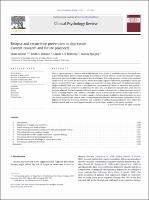Please use this identifier to cite or link to this item:
https://hdl.handle.net/20.500.12202/9674| Title: | Relapse and recurrence prevention in depression: Current research and future prospects |
| Authors: | Beshai, Shadi Dobson, Keith S. Bockting, Claudi L. H. 0000-0002-3676-4083 |
| Keywords: | Depression Relapse Recurrence Prevention Psychotherapy |
| Issue Date: | 2011 |
| Publisher: | Elsevier Ltd |
| Citation: | Beshai, S., Dobson, K. S., Bockting, C. L. H., & Quigley, L. (2011). Relapse and recurrence prevention in depression: Current research and future prospects. Clinical Psychology Review, 31(8), 1349–1360. https://doi.org/10.1016/j.cpr.2011.09.003 |
| Series/Report no.: | Clinical Psychology Review;31(8) |
| Abstract: | There is a growing body of literature which indicates that acute phases of psychotherapy are often ineffective in preventing relapse and recurrence in major depression. As a result, there is a need to develop and evaluate therapeutic approaches which aim to reduce the risk of relapse. This article provides a review of the empirical studies which have tested the prophylactic effects of therapy (cognitive-behavioral, mindfulness-based, and interpersonal psychotherapy) targeting relapse and recurrence in major depression. For definitional clarity, relapse is defined here as a return to full depressive symptomatology before an individual has reached a full recovery, whereas recurrence in defined as the onset of a new depressive episode after a full recovery has been achieved. Psychotherapeutic efforts to prevent relapse and recurrence in depression have been effective to varying degrees, and a number of variables appear to moderate the success of these approaches. A consistent finding has been that preventive cognitive-behavioral and mindfulness-based therapies are most effective for patients with three or more previous depressive episodes, and alternative explanations for this finding are discussed. It is noted, however, that a number of methodological limitations exist within this field of research, and so a set of hypotheses that may guide future studies in this area is provided. © 2011 Elsevier Ltd. All rights reserved. |
| Description: | Scholarly article / Open access |
| URI: | https://hdl.handle.net/20.500.12202/9674 |
| ISSN: | 0272-7358 |
| Appears in Collections: | Ferkauf Graduate School of Psychology: Faculty Publications |
Files in This Item:
| File | Description | Size | Format | |
|---|---|---|---|---|
| Quigley Beshai_et_al._2011 OA Relapse.pdf | 269.95 kB | Adobe PDF |  View/Open |
This item is licensed under a Creative Commons License

